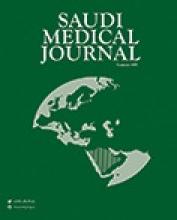Abstract
OBJECTIVE: The present work aimed to estimate the theophylline pharmacokinetic parameters (TH-PKP) in preterm neonates with apnea during the first month of life in order to optimize its dosage regimen.
METHODS: Fifty preterm neonates enrolled in the study with recurrent apnea were admitted during 1998-2000 to the Neonatal Intensive Care Unit of Maternity and Children's Hospital, Al-Mosaida, Jeddah, Kingdom of Saudi Arabia. Criteria for this study were preterm with gestational age (GA) of 26-33 weeks (mean +/- SD 30 +/- 3.9). They received TH of 3-6 mg/kg loading dose (LD) followed by maintenance dose (MD) of 0.5 - 3.0 mg/kg/12 hours. Eight of these patients received phenobarbital and 19 received cimetidine concomitantly for at least 7 days. Blood samples were taken one hour post LD and at steady state (Css). Theophylline levels were determined by fluorescence polarization immunoassay.
RESULTS: Phenobarbital significantly enhanced TH clearance (CL) and reduced its half-life (t0.5) but cimetidine had no significant effect. Excluding patients receiving phenobarbital. The mean +/- SD TH-PKP were volume of distribution (Vd) = 0.77 +/- 0.25 L/kg; elimination rate constant (Ke) = 0.027 +/- 0.011 h-1; CL = 0.019 +/- 0.006 L/h/kg, t0.5 = 30.7 +/- 12.1. There was marked intra patient variability in all TH-PKP.
CONCLUSION: In view of the results and practical considerations, initial dosage regimen to attain a TH Css level within the therapeutic range (6-12 ug/ml) was suggested: LD 6-7 mg/kg, MD 1.5 - 2.0 mg/kg/12 hours. To compensate for maturation changes or drug interaction, a method, based on estimation of individual TH CL, was described for adjusting MD.
- Copyright: © Saudi Medical Journal
This is an open-access article distributed under the terms of the Creative Commons Attribution-Noncommercial-Share Alike 3.0 Unported, which permits unrestricted use, distribution, and reproduction in any medium, provided the original work is properly cited.






